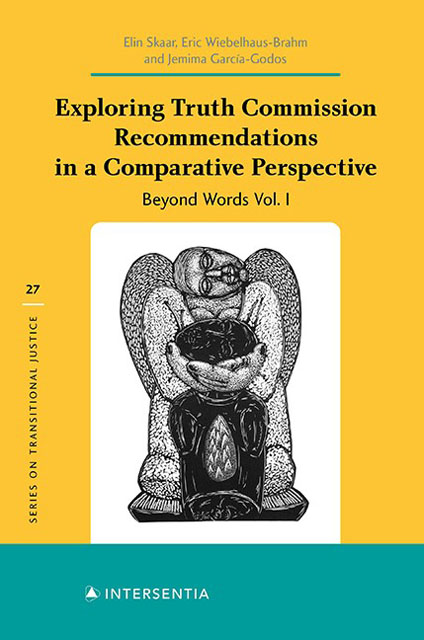Book contents
- Frontmatter
- Preface
- Contents
- List of Acronyms and Abbreviations
- List of Tables and Figures
- Chapter 1 Exploring Recommendations
- Chapter 2 Researching Recommendations
- Chapter 3 Counting and Classifying Recommendations
- Chapter 4 Formulating Recommendations
- Chapter 5 Case Studies of Implementation
- Chapter 6 A Cross-National Analysis of Implementation
- Chapter 7 Conclusions
- Appendix I Latin American truth Commission Reports
- Appendix II Information on 13 Latin American truth CommissionReports and their Recommendations
- Appendix III Excerpts from the truth Commission Recommendations Data Code Book
- Appendix IV Implementation of the Recommendations Made by 13 Latin American truth Commissions
- Appendix V Implementation Rates for Recommendations Made by 13 Latin American truth Commissions, by Category
- Appendix VI Overview of Commissioners of 12 Formal Latin American truth Commissions
- Appendix VII Latin American Countries Signatories to and Ratification of the International Convention for the Protection of All Persons from Enforced Disappearance (2006)
- Bibliography
- Index
- About the Authors
Chapter 5 - Case Studies of Implementation
Published online by Cambridge University Press: 19 November 2022
- Frontmatter
- Preface
- Contents
- List of Acronyms and Abbreviations
- List of Tables and Figures
- Chapter 1 Exploring Recommendations
- Chapter 2 Researching Recommendations
- Chapter 3 Counting and Classifying Recommendations
- Chapter 4 Formulating Recommendations
- Chapter 5 Case Studies of Implementation
- Chapter 6 A Cross-National Analysis of Implementation
- Chapter 7 Conclusions
- Appendix I Latin American truth Commission Reports
- Appendix II Information on 13 Latin American truth CommissionReports and their Recommendations
- Appendix III Excerpts from the truth Commission Recommendations Data Code Book
- Appendix IV Implementation of the Recommendations Made by 13 Latin American truth Commissions
- Appendix V Implementation Rates for Recommendations Made by 13 Latin American truth Commissions, by Category
- Appendix VI Overview of Commissioners of 12 Formal Latin American truth Commissions
- Appendix VII Latin American Countries Signatories to and Ratification of the International Convention for the Protection of All Persons from Enforced Disappearance (2006)
- Bibliography
- Index
- About the Authors
Summary
Uttering a word is like striking a note on the keyboard of the imagination.
– Ludwig Wittgenstein, philosopher (1889 – 1951)What has happened to the roughly 1000 recommendations that Latin American truth commissions have made over the past four decades? Did they remain just words on paper, or have they been implemented? This is a highly relevant empirical question if one is concerned with the impact and relevance of truth commissions. This chapter zooms in on each of the 13 formal truth commissions established in Latin America between the mid-1980s and the mid-2010s to provide a flavour of the implementation record of their recommendations. Whereas most qualitative comparative work on truth commissions focuses on their establishment, mandates, and operations (Bakiner 2016; Hayner 1994; Hayner 2011; Wiebelhaus-Brahm 2010), we present 13 mini case studies of truth commissions, focusing specifically on their recommendations and the degree of implementation .
The final reports of these commissions have, as suggested earlier in this book, made a wide range of recommendations covering numerous substantive issues. In Chapter 3, we introduced seven substantive categories plus an “other” category to group and systematize the recommendations: Institutional reform, legal reform, constitutional reform, criminal prosecution, reparations, nonrepetition measures, follow-up measures, and “other” measures. When coding the recommendations according to these categories, we ended up with 1512 coded recommendations, based on the fact that recommendations are sometimes crafted in complex ways such that one recommendation asks the state to do multiple things. Each of these coded recommendations is what we refer to as an action item. They are the units of analysis in this chapter.
The following analysis is based on three main types of source material: (1) data on implementation for each of the 13 truth commissions, specifically collected for the Beyond Words project, of which this volume forms a part; (2) the country chapters written for each of the truth commission cases, using the data collected for this project, which appear in a companion volume (Skaar, Wiebelhaus-Brahm, and García-Godos (eds.) 2022); and (3) secondary sources. Note that the secondary literature is very uneven. There is quite a large scholarly literature on some of the truth commissions, namely Chile's Rettig Commission, Argentina's CONADEP, Guatemala's Commission for Historical Clarification and Peru's CNV, though surprisingly few scholars have concerned themselves specifically with their recommendations.
Information
- Type
- Chapter
- Information
- Exploring Truth Commission Recommendations in a Comparative Perspective: Beyond Words Vol 1 , pp. 113 - 142Publisher: IntersentiaPrint publication year: 2022
